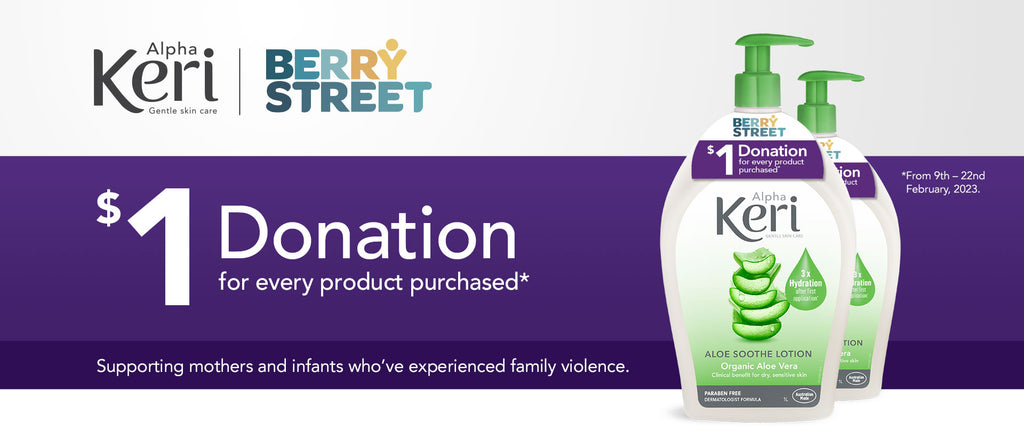We get a LOT of questions about the best ways to deal with sensitive skin concerns. Given how varied these concerns can be and how crowded the skincare aisle is - we decided to compile a go-to FAQ to help you out on your skincare journey.
What does pH balanced mean?
Sensitive skin requires gentle, pH-balanced products. A healthy pH balance means ensuring the skin's acidic and alkaline levels are harmonised as this balance can impact blemishes, breakouts and signs of aging such as wrinkles[1]. Everyone’s pH levels are a little different, so finding the right skincare for you may take some trial-and-error. We may be a little biased, but we recommend the Alpha Keri Super Hydrating range as it is pH-balanced and dermatologically tested for extra gentle care.
What can I do for dry, sensitive skin??
Dry, sensitive skin can be the result of many factors including the environment, diet and the impact of every day application of cosmetic products. Vitamin E is a powerful nutrient and skin conditioning ingredient that can[2] support the strong moisturising properties, thus improving the appearance of the skin[3].
Should you experience ongoing, irritated skin or it gets worse, we recommend making an appointment with your healthcare professional.
I think I have a skin allergy, what should I do?
If you are concerned that you have an allergy or sensitivity affecting your skin, you can visit your doctor If you are concerned that you have an allergy or sensitivity affecting your skin, you can visit your doctor to have this tested. Most commonly, a skin allergy test involves the doctor exposing your skin to various substances believed to be causing the reaction in order to observe and monitor the reaction. Following results, ask your doctor to provide an allergy treatment plan to ensure you are equipped and prepared to deal with the allergy or sensitivity.
How does a dermatologist treat dry skin?
If you are experiencing persistent dry skin, you can consult a dermatologist to determine what factors might be generating these symptoms. A dermatologist may recommend frequent application of a moisturiser, medication or changing aspects of your day that are causing the dry skin symptoms. To ensure that you get the most out of your appointment, we recommend keeping a ‘skin diary’ monitoring the symptoms and possible causes that you’ve been exposed to each day for two weeks in the lead up to your appointment.
Which clothing fabrics are less irritating to sensitive skin?
It may come as no surprise that smooth, soft, natural fabrics, such as silk and fine cotton, will feel best against your skin. Cotton is cool and breathes, where as silk is warmer. Both fabrics are absorbent, helping to wick moisture away from the skin. Clothing that is loose-fitting with a minimum of creases and folds will offer your skin the maximum comfort. Fabrics that trap moisture, such as tighter fitting synthetics, or material with elastic - may aggravate skin, and should be replaced with gentler fabrics should you experience irritation in the associated area.
When is the best time to shave to avoid dry or irritated skin?
Shave with a soft body wash during or after a shower or bath when the hair follicle is soft. Avoid hot water and harsh soaps which may dry out the skin. After shaving, moisturise skin to calm any follicles that may have been aggravated. Alpha Keri Aloe Soothe Cream is dermatologically tested to gently nourish skin, and is ideal for a post-shave moisturisation.
How do I prevent my hands from feel dry after using cleaning products in the kitchen, laundry and bathroom?
Everyday activities can cause dry skin, including household chores! Long or frequent exposure to water or detergent can dry or irritate our skin. Try applying moisturiser to your hands regularly and wearing gloves while cleaning, particularly if your cleaning products contain soap or chemicals. We also recommend having a pump bottle of lotion in these rooms, to ensure that you keep moisturising top-of-mind.
When should I see a health professional for my sensitive skin?
A pH balanced, fragrance-free moisturiser is a great skin care item to assist in moisturising dry or sensitive skin, however, if you experience any of the following symptoms then you should consult your healthcare provider for advice:
- Itchiness without a visible rash
- Sleeplessness due to itchy or dry skin
- Sustained open cuts or sores from scratching itchy skin
- If self-care steps do not relieve dry or itchy skin
Should I have a hot or cold shower for dry skin?
Bad news for the long hot shower lovers - too much heat to the skin (as with rays from the sun) are ill-advised by healthcare professionals. Hot showers and baths can inflame the skin, which can cause redness and itching. Opt for cooler lukewarm[4] showers to help keep your skin retain its moisture. Avoiding harsh, soapy products and lengthier showers or baths can also help your skin to retain healthy, natural moisture levels.
Should I apply moisturiser to damp or dry skin?
A moisturiser assists your skin to trap in moisture, therefore the best application time is right after a shower or bath. Pat your skin dry with a towel and apply liberally. Do the same after washing your face and hands.
References:
1. Everyday Health (What is skin pH? How to tell if yours is healthy and why it matters): https://www.everydayhealth.com/skin-beauty/skin-ph-yours-healthy-why-it-matters-how-tell/
2. Medical News Today (Top Benefits of Vitamin E oil): the skin’s condition and apperance https://www.medicalnewstoday.com/articles/318168
3. National Eczema Association (Complementary, alternative treatments to eczema): https://nationaleczema.org/5-new-ish/
4. Health University of Utah (Hot showers can dry out your skin): https://healthcare.utah.edu/the-scope/shows.php?shows=0_8qzmzdxl



